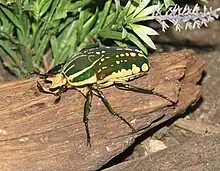Mecynorhina polyphemus
Mecynorhina polyphemus is a large scarab beetle of the subfamily Cetoniinae found in dense tropical African forests, sometimes called the Polyphemus beetle. It is a frequent feeder on fruits and sap flows from tree wounds.
| Mecynorhina polyphemus | |
|---|---|
 | |
| Male | |
 | |
| Female | |
| Scientific classification | |
| Kingdom: | |
| Phylum: | |
| Class: | |
| Order: | |
| Family: | |
| Subfamily: | |
| Tribe: | Goliathini |
| Subtribe: | Coryphocerina |
| Genus: | |
| Subgenus: | Mecynorhina |
| Species: | M. polyphemus |
| Binomial name | |
| Mecynorhina polyphemus (Fabricius, 1781) | |
The larvae develop in decomposing log compost. The third instar constructs an ovoid cocoon for metamorphosis and attaches it to a solid surface. In captivity, the instar may attach the cocoon to a glass container wall allowing the opportunity to view the transformation.[1]
Male and female are dimorphic. The female has a shiny surface texture, reflective prismatic coloration, and no horns. The male has horns and flat, velvety coloration. Females are typically 35–55 mm, while males range from 35 to 80 mm.[2]
Subspecies
- Mecynorrhina polyphemus polyphemus Fabricius, 1781 (Ivory Coast, Ghana; Size: ♂ 44–72 mm; ♀ 41–50 mm)
- Mecynorrhina polyphemus confluens Kraatz, 1890 (Democratic Republic of the Congo, Republic of the Congo, Ivory Coast, Gabon and Uganda; Size: ♂ 42–80 mm; ♀ 42–55 mm)
References
- "Insect Collection". Archived from the original on 2011-07-13. Retrieved 2010-12-29.
- "CHELORRHINA". Retrieved 2010-12-29.
This article is issued from Wikipedia. The text is licensed under Creative Commons - Attribution - Sharealike. Additional terms may apply for the media files.